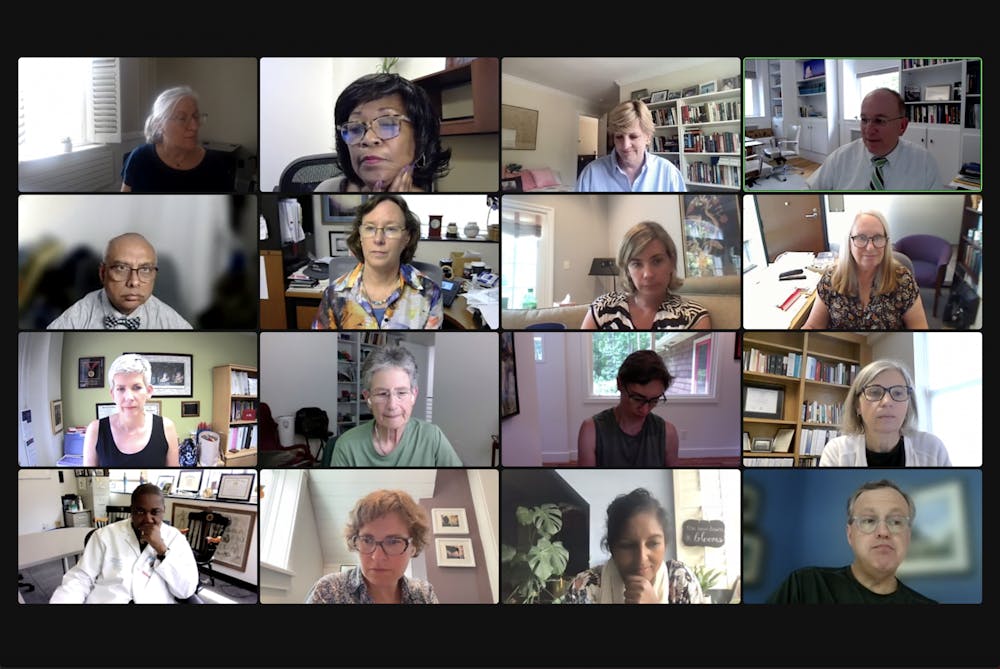At Monday's Faculty Executive Committee meeting, members discussed newly recruited campus leaders and how COVID-19 will be handled going into the fall semester, including ways to incentivize students and faculty to spend more time on campus.
What’s new?
- UNC executive vice chancellor and provost Chris Clemens updated the committee about the provost office and its transition team.
- Clemens said he committed in February to restructure the provost office to be more responsive and efficient. He said the implementation of this restructuring will not be finished by the end of June.
- Clemens also said that he has opened a call for a Vice Provost for Faculty Affairs. He said this would not be a full-time administrator, and that the position would be responsible for ensuring that appointments, promotions and tenure awards are done according to policy.
- He also said that the office has added more supportive faculty human resources, including a new Assistant Provost for Faculty Affairs position, which was filled by Lachonya Thompson.
- Clemens said that the lead for the School of Data Science and Society will be announced by the end of the week and that a decision is close on the dean for the Gillings School of Global Public Health.
- Clemens said that the School of Data Science and Society will be a great benefit to students and is included in the governor's budget.
- The committee also discussed how the University will handle COVID-19 in the fall semester.
- Clemens announced that international travelers will no longer have to have a negative test to reenter the country will benefit students studying abroad.
- He said currently Orange County is considered a medium-risk area based on cases and low-risk based on hospitalization.
- Clemens said the UNC testing center was “irrevocably shut down” due to the “enormous maintenance” the machines required. The University will not be maintaining its service agreement on them.
- “We believe that symptomatic testing in the health center will be sufficient for what we need to do on campus," Clemens said.
- Clemens said vaccines should continue to be encouraged, and that the University will follow Orange County guidance on masks and continue to wear them in clinical settings.
- He said the University will be “operating normally.”
- Clemens then opened the floor to the committee for comments.
- Committee member Misha Becker asked for a clearer definition of “operating normally.” Becker asked whether faculty will be expected to make classes accessible remotely by recording and live streaming.
- Clemens said that it is likely that faculty will be asked to be generous with excused absences for COVID-19, but that he saw a 10 percent drop in assessment scores for his own students, which he attributed to attendance issues.
- “Learning it from the recordings is not the same," Clemens said.
- Joy Renner discussed the “trickle-down effect of COVID,” which she said has left her students unprepared for in-person classes and knowing less content than in previous years.
- Renner said that students need to be reminded why they came to a “brick and mortar” university instead of a remote university: the environment and relationship with talented faculty.
- Beth Mayer-Davis brought up the “other side of this coin,” which is that faculty need to be on campus outside of class and office hours to contribute to the University’s “learning community” and to “greet and support” students.
- “Each Dean needs to set a kind of cultural expectation for the school,” Clemens said.
- He said this issue will be difficult to balance with the doubling loss rate among staff.
- Barbara Entwisle said she doesn’t consider it a “dean-level issue.” Clemens asked the committee to submit ideas about how to encourage faculty to be more present and agreed that the responsibility was not just on the deans.
- Deb Aikat said the University needs to have more clear communication with students, citing an issue with students in his class who were unaware of pass-fail deadlines.
- Aikat also said that the University's Administrative Office Building has been empty, the once full parking lot vacated.
- “You could play frisbee in that parking lot, and nobody would be interrupted,” Aikat said.
- Aikat said that the flexibility that has resulted from COVID-19 is good, but it has gone so far that work is being affected.
- Clemens agreed that going into the next semester clear expectations must be defined and articulated in advance. He said the University will be moving back to pre-COVID-19 pass/fail deadlines.



